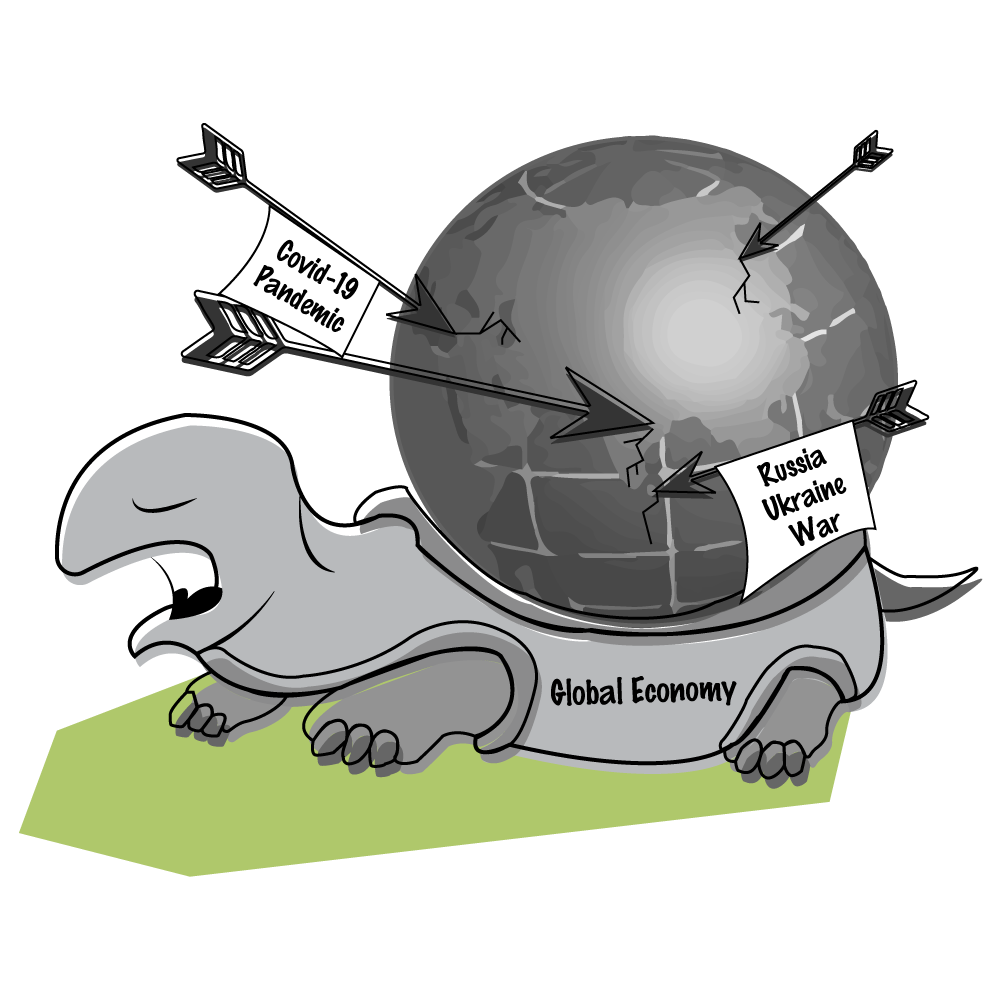Pandemic, War & The Global Slowdown

The latest
A sharp rise in prices of essential commodities including food items and fuel in India have put the spot- light back on the global slowdown in the aftermath of the most disastrous events in this decade. The Covid19 pandemic, the supply chain disruption due to continual lockdowns in China and the war between Russia and Ukraine have undoubtedly spiralled the world into global recession. It has led to uncertainty on lives and livelihoods of people around the world.
The Sri Lanka saga
The crisis in Sri Lanka seems to be an obvious demonstration of this. The island nation is currently in the midst of an unprecedented economic, political and social crisis. A state of emergency has been declared in Sri Lanka. The brewing economic crisis led to growing social unrest and eventually the political breakdown. The crisis is far from over though.
The build-up to meltdown:
- Economic mismanagement and rampant corruption by successive governments seem to have begun the downward spiral. Deep tax cuts – offering subsidised tax rates to the citizens hit the exchequer. Revenue dwindled.
- Imports of chemical fertilizers were restricted. People were asked to rely on their home-grown chemical fertilizers (as against imported ones). The intention seemed to be to promote organic farming. However, the move failed as there was severe damage to harvest. This led to shortage / availability of food grains. This in turn increased food prices due to shortage of food grains and other essential commodities.
- The country had to rely heavily on its foreign reserves to run the country. This depleted the foreign reserves as well by almost 70% in a span of few years.
- Consequently, foreign debt piled on even as the country suspended its repayment of foreign debt of USD 50 billion.
- The Covid pandemic has only worsened the situation. The island nation which is dependent on tourism, travel and hospitality took a major hit due to lockdown(s) around the world.
- Despite the country being appreciated for its handling of the Covid crisis and the vaccination drive, the economy was crumbling. Sri Lanka was almost out of stock of food, essential supplies and fuel.
- Getting into agreements with China for development of certain infrastructure such as ports only landed the island natin in a debt trap with the other country.
Lack of essential commodities, sharp inflation and rise in prices and an apparent indifference by the government led to the people taking to streets and storming offices / residences of the leaders.
The government of Sri Lanka had reached out to the International Monetary Fund (IMF) for structuring and assisting in a bail out economic package.
In the meanwhile, India has been leading the path in aiding Sri Lanka with almost USD 4 billion initially, they government is in talks as it is keen in helping its neighbour recover from this crisis. The Asian Development Bank and the World Bank is also assisting the island nation recover.
The story elsewhere, everywhere
Sri Lanka is a glaring example. The story seems to be same in other countries and not just those only those which rely on tourism and hospitality. Not only in such countries, almost all countries, (developed and developing) saw substantial increase in unemployment due to the Covid pandemic. Essential commodities got dearer straining macro and microeconomics of nations and its people.
The impact of the Russia-Ukraine war
While things began looking early 2022, the Russian invasion of Ukraine only intensified the situation.
- The supply chain which was already affected due to Covid pandemic was further disrupted when war broke out.
- The threat of world war especially of a nuclear kind has been looming large.
- Ukraine produces almost 50% of the total sunflower oil in the world. A direct fall out of the Russian invasion has been the rise in prices of essential oils such as sunflower oil.
- The closure of seaports limited the transport into and out of Ukraine hampering supply of essentials. The war also ravaged agriculture thereby steeply increasing the price of wheat. The deficit in supply from Ukraine was partially met by India – worlds’ second largest producer of wheat. However, in May 2022, India banned export of wheat citing food security as the rising prices put pressure on domestic supply and the government intended to regulate the supply to vulnerable countries as well.
Global consequence(s)
The World Bank published a report in June 2022 predicting that the global growth will peg at about 2.9% (as against 5.7% that was originally projected). In developing economies, a 3.4% growth is projected (as against almost 6.6% originally predicted). The downward revision is primarily due to the Russian war and the pandemic.
The possibility of global stagflation is not being ruled out. An economic condition that first emerged in the 1970’s during the great economic depression, stagflation is a combination of stagnation in growth and inflation. It is caused due to slow economic growth, rising prices and unemployment. India, however, is optimistic that it may not be much impacted by stagflation due to its prudent economic policies.
The road to recovery
Countries must unite in ensuring that the war by Russia on Ukraine stops. A concerted and combined effort must be made by all nations (especially developed and the economically stronger ones) in ensuring uniform supply of essential commodities such that the developing and low-income economies are not left poorer. This is the only way prices will stabilize besides uninterrupted supply. International Monetary agencies have to re-focus their efforts on framing policies that tackle with rising debt issues of countries. Health infrastructure is key to any country. The cliché is true. A healthy nation is a wealthy nation.

